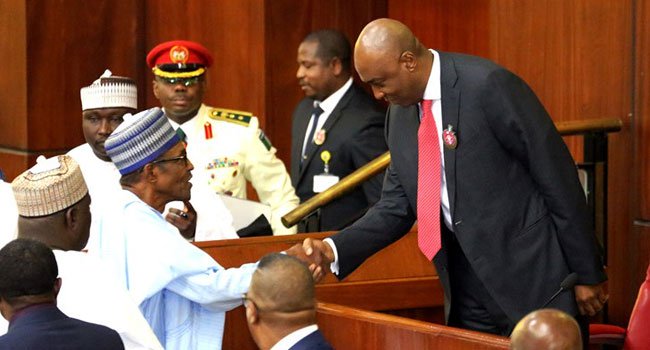The President of the Senate, Dr Bukola Saraki, has urged President Muhammadu Buhari to assent to the Petroleum Industry Governance Bill(PIGB) and other bills critical to national development.
Saraki said this in his opening remarks at the 2019 budget presentation by President Muhammadu Buhari, the speech was however not delivered at the ceremony, but was made available to newsmen.
He noted that in response to the economic recession, the National Assembly passed a number of bills to assist the executive mobilise investment into the country to stimulate economic activities.
He said the PIGB alongside National Transport Commission Bill and Federal Road Authority Bill, had not been signed into law, contrary to the expectations of many.
“Let me make it clear that the National Assembly appreciates Your Excellency’s assent to some of these bills.
“We recognise the prerogative of the president to sign or not to sign these bills.
“However, we believe that some of the issues cited for withholding assent may be better addressed through further technical engagements, since the bills are, in the main, aligned to government policy direction,’’ he said.
Saraki said unless the country’s laws were improved upon to create the right structures that enable the private sector to power the economy, job creation and opportunity to thrive and prosper would be difficult.
“I must commend the President for the Social Investment Programme initiative.
“However, as laudable as this initiative has been, it is pertinent to note that the current approach is unlikely to have a sustainable, measurable impact that is free of corruption and abuse.
“You will agree with me that such a programme should carry no whiff of politicisation. Our role as leaders must always be to ensure that we deliver governance results that do not discriminate.
“We should also ensure that all Nigerians irrespective of ethnicity, religion and political stride have access and are seen to be treated equally,” he said.
Saraki expressed the National Assembly’s readiness to work with Buhari on the peoples-oriented programmes of the administration to ensure success.
He assured the President that the assembly would continue to work with him and his team to ensure that whatever was required through legislation and oversight to plug revenue leakages and ramp up revenues was given priority.
The News Agency of Nigeria (NAN) reports that Buhari on Wednesday unveiled a budget of N8.83 trillion for 2019.
The budget is N300 billion lower than the N9.1 billion being implemented in the current fiscal year.
The sum of N4.04 trillion or 50.31 per cent is earmarked for recurrent expenditure and N2.03 trillion representing 22.98 per cent is for capital projects.
Other estimates are N492.36 billion for Statutory Transfers, N2.14 trillion for Debt Servicing and N120 billion as Sinking Fund.
The budget is based on an oil production estimate of 2.3 million barrels per day and an exchange rate of N305 per dollar.
Other benchmarks are Real Gross Domestic Product (GDP) growth rate of 3.01 per cent and inflation rate of 9.98 per cent.
The total projected revenue is N6.97 trillion, which is three per cent lower than the 2018 estimate of N7.17 trillion.
The expected incomes consist of oil revenue projected at N3.73 trillion, and non-oil revenue estimated at N1.39 trillion.
Meanwhile, estimate from non-oil revenue consists of N799.52 billion from company income tax; N229.34 billion from value added tax, and customs duties of N302.5 billion.
“Other revenues expected in 2019 include various recoveries of N203.38 billion; N710 billion as proceeds from the restructuring of government equity in joint ventures, and other sundry incomes of N104.1 billion.
The N8.83 trillion proposed expenditure for 2019 includes grants and donor funds amounting to N209.92 billion.
The budget deficit is projected to decrease to N1.86 trillion or 1.3 per cent of the GDP in 2019 from N1.95 trillion projected for 2018.
On sectoral allocation, the Ministry of Interior would get N569.07billion, Defence-N435.62 billion, Education-N462.24 billion and Health, N315.62 billion.
